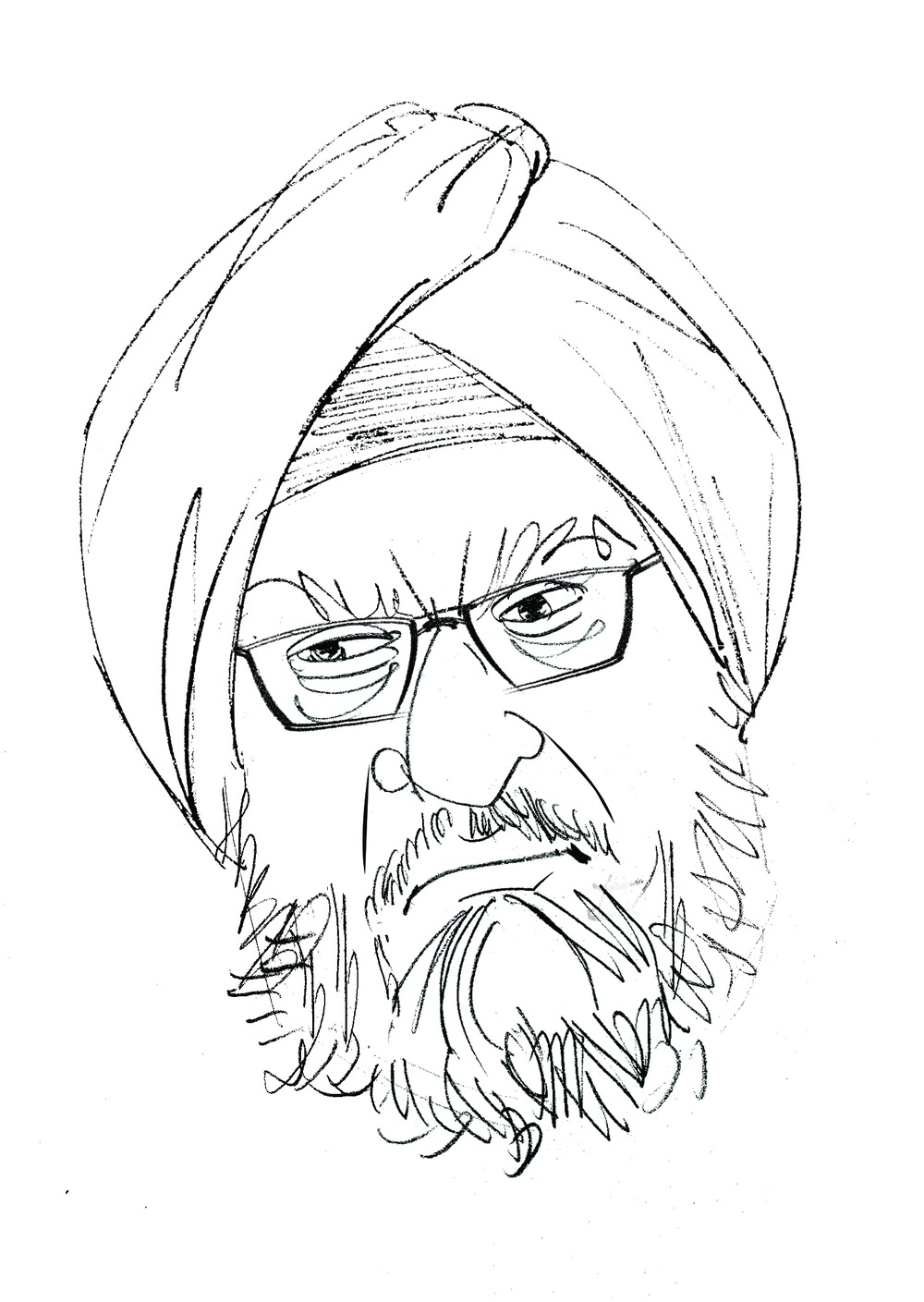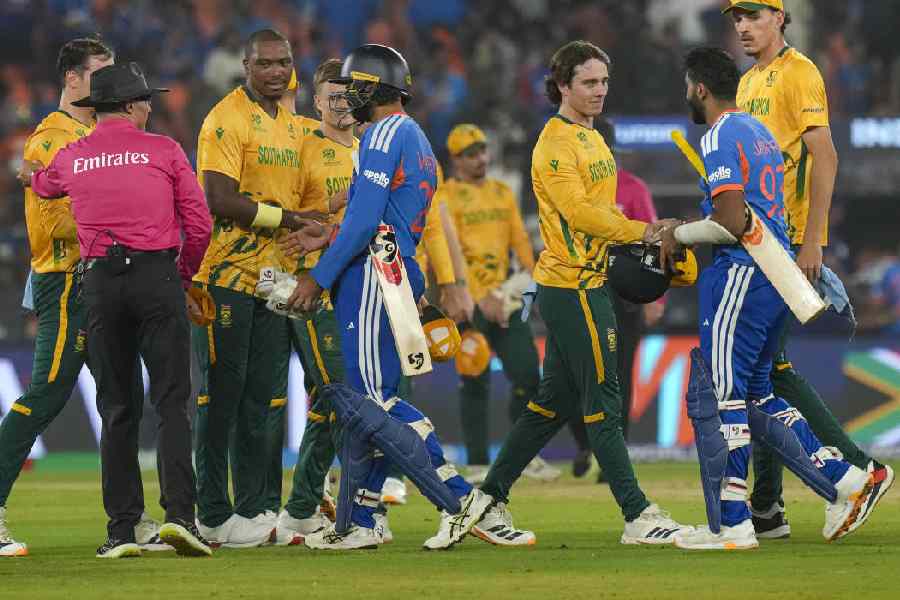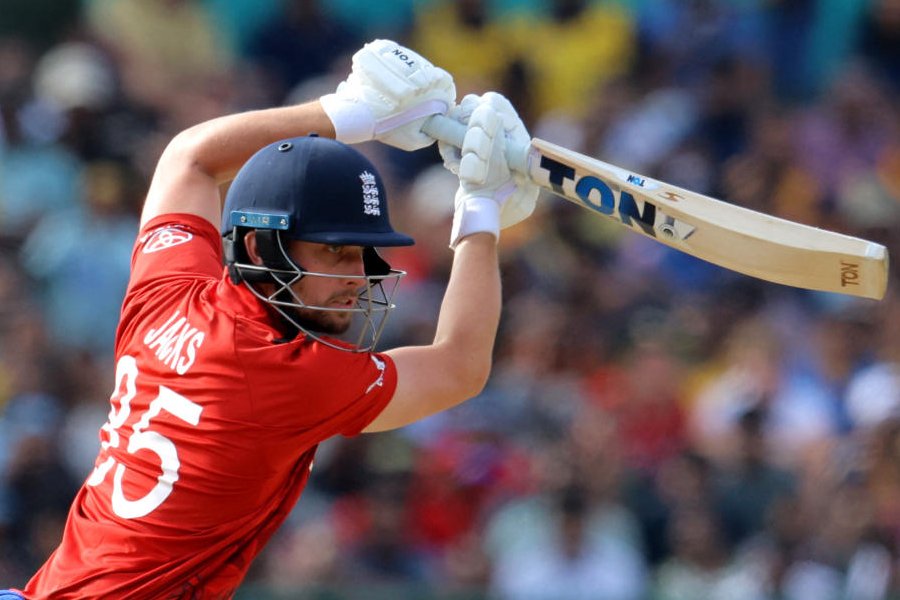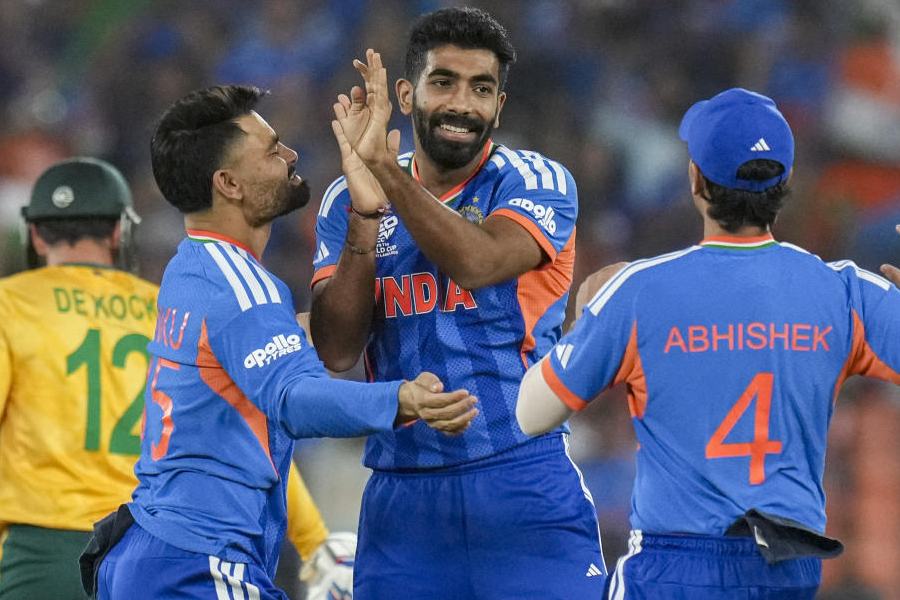
There is no other word for it - Bishan Singh Bedi is testy, if you'll pardon the pun. He is still to recover from a bout of flu, and cricketers - on the television screen before him - are clearly no ministering angels.
"Are the spinners holding the ball or is the ball holding them?" he asks about the quality of spin bowling in the ongoing Test series between India and England. "How can they bowl two or three full tosses and long hops per over?" The English team fare no better - "absolutely listless", he says with a dismissive wave of the hand.
Bedi, 70, has ventured out of his farmhouse on the outskirts of Delhi after a few days in bed, nursing his cold. We are sitting at his friend's office in Lajpat Nagar, where the TV blares. Bedi, resplendent in a bright yellow turban, looks dapper: orange shirt, black bundee, khaki trousers.
I have just been witness to an engrossing conversation between him and Rajinder Amarnath, former first-class cricketer and son of the legendary Lala Amarnath. They have been regaling each other with old cricket stories, mostly poking fun at cricket administrators. If Amarnath has a story on how an administrator saved money by forcing first-class cricketers to stay in a dharamshala, Bedi has us in splits over the tale of a selector who was given a suit as a bribe. And when he failed to place the briber in the team, he had to put up with the constant demand for the suit to be returned. More such stories tumble out.
"Only the faces have changed," Bedi laughs. "And money, of course."
Bedi, a remarkable left-arm spinner with a lyrical action and a lethal loop, has often battled with cricket authorities. If he was the Angry Young Man of Indian cricket in the 1980s, ready to pounce on any administrator who, in his opinion, was in the wrong, he is very much an Angry Old Man now. "I Will Fight Until My Death," he had said way back in 1980 against the Delhi District Cricket Association (DDCA), with whom he's fought an extended battle royale.
His war against cricket irregularities may finally be bearing fruit. The DDCA and the Board of Control for Cricket in India (BCCI) are being hauled up by the Supreme Court of India. "There is some light at the end of the tunnel," he says, stroking his snowy beard.
"While Tiger Pataudi was 50 years ahead of his time, Justice Lodha is probably 50 years too late," Bedi says. M.A.K. "Tiger" Pataudi was his favourite captain; Justice R.M. Lodha, who heads the committee set up by the Supreme Court to look into various aspects of the BCCI, probably his favourite sleuth. Justice Lodha, he holds, has done a "thorough job of getting to the bottom of Indian cricket and exposing all the muck that has accumulated there".
But the BCCI has been holding its own before the Supreme Court, I point out. "They are struggling, aren't they," Bedi retorts and breaks into Hindi. " Jhooth bahut kapde badalta hai aur sach nanga bhaag raha hai (Falsehood changes clothes repeatedly but truth is running naked)."
Some independent observers have opposed the court's interference. Are efforts being made to "nationalise" the BCCI, which is and runs itself like a private enterprise?
Bedi's face turns red. He leans forward and raises his voice. "BCCI kisi ke baap ka dhanda nahi hai. It is not a private enterprise. They are accountable to the people of this country," he thunders. "Tailor masters, insurance agents and stationery shop owners have managed it over the years and made crores of rupees. There has been zero accountability."
Surely it has done something right in all these years? Look at how successful the Indian cricketing enterprise is, on the field and financially.
"Whatever good has happened for the BCCI has happened by sheer providence. All great players have come up on their own and the game was popular even in my childhood," says Bedi.
He calms down to speak in measured tones about how a cricketer should be a good student of the game and an administrator a good servant. "Bossing over the game will not do. The game is the boss."
Bedi's has mostly been a lone battle. A few others such as Kirti Azad joined him later. The tag of a one-man-talking-show doesn't bother him. "I am very happy to be in a majority of one. I never feel that I was alone. You call me stupid, but compromise is a weak word for me. I work on a platform of strength."
One aspect of cricket troubles particularly troubles him. "Absolute giants of Indian cricket are prostrating before the BCCI. For what? I don't have an answer when people ask me about them." He doesn't name names - but cricket lovers would know the allusions.
In his heyday, Bedi was known as a bowler with a heart. He didn't mind giving the ball air, a rarity now, and mesmerise batsmen with his guile and control, fooling them with just a slight change to every delivery. He was a merchant of wickets, he bought them. Writing about Bedi, former English captain Mike Brearley had said in 2008, "The first epithet that comes to mind for Bishan Bedi's bowling is 'beautiful'. More than with any other slow bowler, this is the word that stays."
Bedi marked his presence even as a captain in the late Seventies when he led Delhi to Ranji Trophy victories. But he was stripped of his captaincy, and his fight with the DDCA reached new highs. "It is an absolutely wretched organisation," Bedi says.
Administrators in Delhi, he claims, have adopted a simple formula to divide cricketers. "Quote me on this," he says, wagging a finger. "Arun Jaitley once said that it was easy to deal with cricketers. He said, 'Give some cricketers more money than the others and they will never be united.'"
Bedi was not always critical of the BCCI. He was appointed the manager of the India team travelling to New Zealand in 1989-90. But it was a short-lived task. After a loss in a one-day International, he was quoted as saying that he wouldn't stop any Indian cricketer if they wanted to jump into the Pacific. That did it.
He alleges that media played up the statement, making it sound like he was in favour of the team committing suicide. "The media has the sole right to run with the hares and hunt with the hounds. What to do," he says with a shrug.
His record as the India captain was no less controversial. There were times when Bedi asked his team to walk away or declare an innings in protest against decisions by umpires. "I didn't take controversial decisions. I took decisions as I saw them. You must do your homework properly before questioning me. Don't go by what you have read on Google. Read about the history and the context of these matches and get back to me," he says, now sounding really irritated.
I move on to other subjects. What does the man, often described as one of the greatest spinners of all time, feel about modern spinners? The only one who impressed him was Anil Kumble. "He was a limited but a very intelligent bowler."
What about India's latest spin sensation, R. Ashwin? "I love his batting," he says with a mischievous smile and pauses, enjoying what he has just said. "If you are a good bowler, you should be good on any wicket. Let me put it this way. Ashwin is too intelligent a bowler to rely on the home advantage."
Bedi used to rail against the ODIs until a few years ago, but his pet hate now is Twenty 20 cricket. "Twenty 20 is absolute crap," he says. It has a huge audience, I demur. "What audience are you talking about? Do they know anything about the game," he asks. The stadiums are generally full, I point out. "Do they go there to see the game or to be seen by the cameras on the ground?"
Does he miss India-Pakistan Test matches and the rivalry of the two teams? "This is a very political question," he remarks, but wants to answer it anyway. "I would like to see Pakistan in India, particularly now when we have these tensions. What I don't understand is why cricket and entertainment are being singled out. If you are so serious, don't play hockey, sever diplomatic and trade relations. Why make cricket and entertainment the scapegoats? It is purely a question of misplaced jingoism."
His son, Angad Singh Bedi, who created quite a stir with his role in Pink, is in the entertainment world. "He has been slogging it out in Mumbai for a few years now. If he had worked this hard on the cricketing field, he probably would have played for India," he says, and laughs.
Deeply spiritual, Bedi says these days he prefers to read and do everything that is good for "cleansing of the soul" than think of contemporary issues. "My cricket and spirituality are intertwined," he says, "The most important thing for me now is how to be at peace with oneself. I never think about the days that have gone by. I would like to live in the present," he says. "This is the most precious moment."
Not quite a battle-cry, but then tomorrow is another day.
tetevitae
1960: A 15-year-old Bedi plays for Northern Punjab. Six years later he makes his Test debut against the West Indies at the Eden Gardens. It is also the first time he witnesses a Test match
Before the 1968-69 season, he moves to Delhi and thereon represents it in domestic cricket. Cricketer Madan Lal once famously said: 'Bedi was Delhi cricket'
The left-arm spinner with a killer loop is part of India's feared and legendary 'spin quartet'; the others on that team: Erapalli Prasanna, Srinivas Venkataraghavan and Bhagwat Chandrasekhar
1972-77: Plays county cricket for Northamptonshire; as many as 102 matches
1976: Succeeds Pataudi as captain of India. During this time he also courts many a controversy - forfeits ODI against Pakistan to protest unfair umpiring, accuses English cricketer John Lever of using Vaseline to extract more swing and so on
Becomes first Indian bowler to get to bag 200 Test wickets; his career tally of 266 was India's highest until Kapil Dev overhauled it in 1986
1978: After being hammered by Pakistan in a Test series he loses captaincy to Sunil Gavaskar. His relationship with Gavaskar sours and he later openly accuses him of humiliating and sidelining him
1979: Retires with a tally of 1560 first-class wickets and the reputation of being the one and only Bishan










